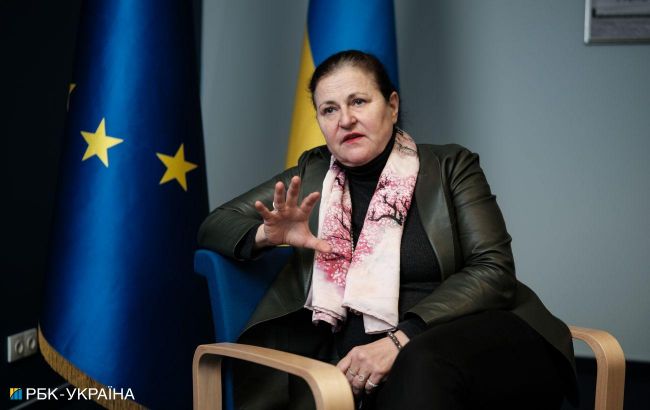EU Ambassador explains Europe's slowed military industry response to war
 Photo: EU Ambassador to Ukraine Katarína Mathernová (Vitalii Nosach, RBC-Ukraine).
Photo: EU Ambassador to Ukraine Katarína Mathernová (Vitalii Nosach, RBC-Ukraine).
Europe's military industry has not responded to Russia's invasion of Ukraine as quickly as Brussels had hoped. This is due to many factors, according to EU Ambassador to Ukraine Katarína Mathernová in an interview with RBC-Ukraine.
"War production is not a natural instinct in Europe. In Europe, we have lived for decades in firm conviction that war on the European continent is no longer possible," she says.
According to her, the EU coped well with this initial shock on February 24, 2022, with political activation, activation of society in terms of showing solidarity in accepting Ukrainian refugees, delivering humanitarian aid, etc.
"I think the industry has moved, perhaps less quickly than we had hoped. But there is now a strong recommitment and strong push also by the governments and the engagement with the private sector, to increase production," Katarína Mathernová says.
The EU ambassador reminds that the EU is a market economy, so it's not as easy to do this as in a command economy like in Russia. "So, yeah, in that sense it has not reacted as quickly as we have hoped," she says.
Katarína Mathernová explains that initially there was market support. "But I think that the industry needed to see the long-term commitment of the government. That was a little bit of a chicken and egg problem," the Ambassador adds.
Ammunition for Ukraine
In March 2023, the EU promised to provide Ukraine with one million artillery shells within one year.
According to the EU High Representative for Foreign Affairs and Security Policy, Josep Borrell, Ukraine will receive 524,000 shells by March 2024. This is 52% of the target.
European Commissioner for the EU Internal Market Thierry Breton has previously stated that by the spring of 2024, the production capacity of defense companies in the EU would be more than a million artillery shells.
Europe may turn to companies in South Korea, Türkiye, and South Africa to purchase the shells.

